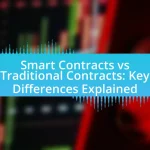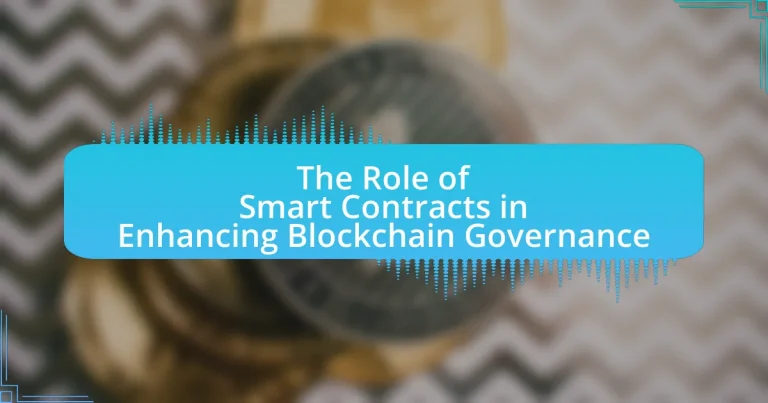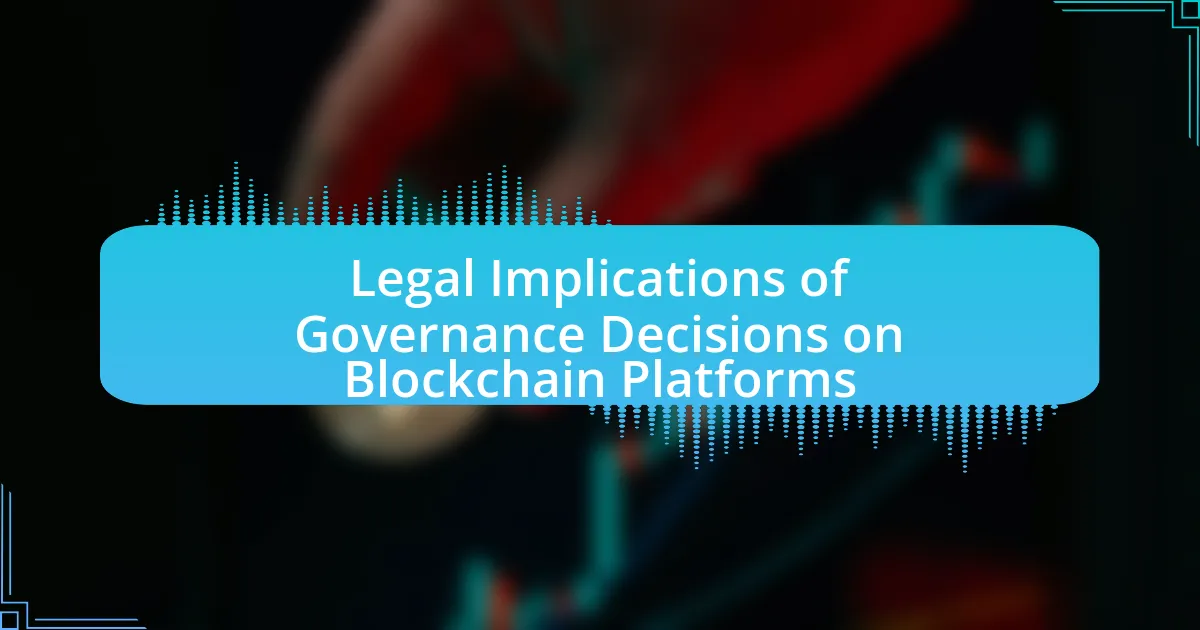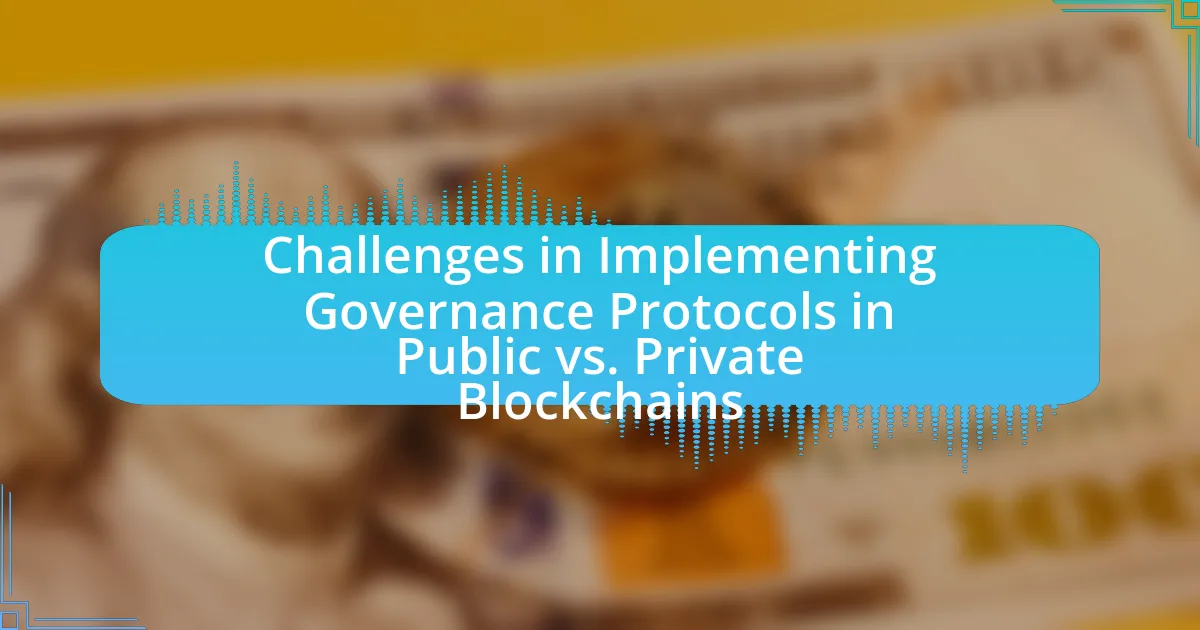Smart contracts are self-executing agreements with terms encoded in blockchain technology, playing a crucial role in enhancing blockchain governance. They automate processes, ensuring transparency and efficiency by eliminating intermediaries, which fosters trust among participants. The article explores how smart contracts function within blockchain ecosystems, their key components, and their ability to improve governance through automation, transparency, and immutability. It also addresses the challenges faced by traditional governance, the potential risks associated with smart contracts, and real-world applications in decentralized organizations. Additionally, the article discusses future trends and practical steps organizations can take to leverage smart contracts for effective governance.
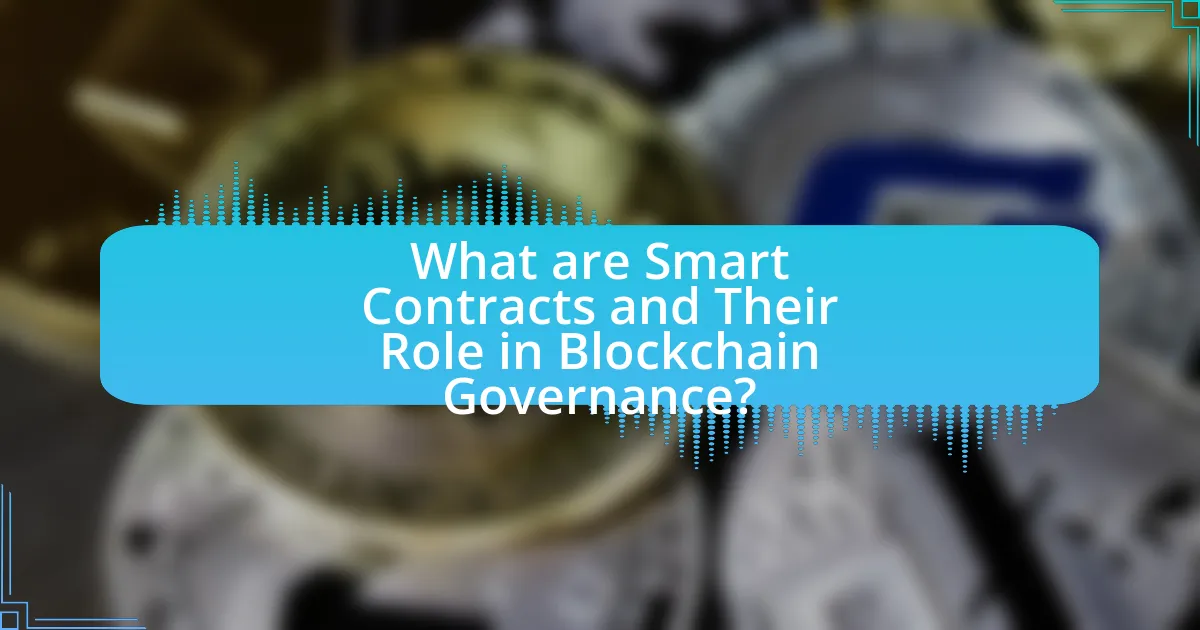
What are Smart Contracts and Their Role in Blockchain Governance?
Smart contracts are self-executing contracts with the terms of the agreement directly written into code, operating on blockchain technology. They facilitate, verify, and enforce the negotiation or performance of a contract without the need for intermediaries, thus enhancing transparency and efficiency in blockchain governance. For instance, Ethereum, a leading blockchain platform, utilizes smart contracts to automate processes such as voting and fund distribution, ensuring that governance mechanisms are tamper-proof and transparent. This automation reduces the risk of human error and manipulation, thereby fostering trust among participants in the governance process.
How do Smart Contracts function within a blockchain ecosystem?
Smart contracts function as self-executing agreements with the terms of the contract directly written into code on a blockchain. They automate processes by executing predefined actions when specific conditions are met, ensuring trust and transparency without the need for intermediaries. For instance, in Ethereum, smart contracts are deployed on the blockchain and can facilitate transactions, manage assets, and enforce agreements automatically, reducing the risk of fraud and increasing efficiency. The immutability of blockchain technology ensures that once a smart contract is deployed, it cannot be altered, providing a secure and reliable framework for governance and compliance within the blockchain ecosystem.
What are the key components of Smart Contracts?
The key components of smart contracts include code, execution environment, and the blockchain network. The code defines the rules and conditions of the contract, typically written in programming languages like Solidity for Ethereum. The execution environment, often a virtual machine, processes the contract’s code when conditions are met. The blockchain network provides the decentralized infrastructure that ensures transparency, security, and immutability of the contract’s execution and data. These components work together to facilitate automated, trustless transactions without intermediaries, enhancing governance by ensuring compliance with predefined rules.
How do Smart Contracts ensure trust and transparency?
Smart contracts ensure trust and transparency by automating and enforcing agreements through code on a blockchain. This automation eliminates the need for intermediaries, reducing the risk of manipulation or fraud. The immutable nature of blockchain technology guarantees that once a smart contract is deployed, its terms cannot be altered, providing a reliable record of transactions. Additionally, all participants in the network can access the same information, ensuring that everyone operates from a single source of truth. This transparency is further reinforced by the ability to audit transactions on the blockchain, as they are publicly recorded and verifiable by any party.
Why is Blockchain Governance important?
Blockchain governance is important because it establishes the rules and protocols that dictate how a blockchain network operates and evolves. Effective governance ensures transparency, accountability, and security within the network, which are critical for maintaining trust among participants. For instance, a study by the Cambridge Centre for Alternative Finance highlights that governance frameworks directly influence the sustainability and scalability of blockchain projects, as they help in resolving disputes and managing changes in protocol. This structured approach to decision-making fosters a collaborative environment, enabling stakeholders to adapt to technological advancements and regulatory requirements efficiently.
What challenges does traditional governance face?
Traditional governance faces challenges such as inefficiency, lack of transparency, and susceptibility to corruption. These issues arise from bureaucratic processes that often delay decision-making and hinder responsiveness to citizens’ needs. For instance, according to a 2020 report by the World Bank, over 50% of public sector projects in developing countries experience significant delays due to bureaucratic inefficiencies. Additionally, traditional governance structures often lack transparency, leading to a trust deficit among citizens; a 2019 Transparency International report indicated that 64% of people globally believe that government corruption is a major problem. Lastly, the potential for corruption is exacerbated by centralized power structures, which can lead to misuse of authority and resources.
How can Blockchain Governance address these challenges?
Blockchain governance can address challenges by implementing decentralized decision-making processes that enhance transparency and accountability. This governance model allows stakeholders to participate in protocol changes and dispute resolutions, reducing the risk of centralization and manipulation. For instance, the use of smart contracts automates governance rules, ensuring that all actions are executed as per predefined conditions, which minimizes human error and bias. Additionally, blockchain’s immutable ledger provides a verifiable record of all governance activities, fostering trust among participants. Studies have shown that decentralized governance structures can lead to more resilient and adaptive systems, as evidenced by successful implementations in various blockchain projects like Ethereum and Tezos, where community-driven governance has led to effective protocol upgrades and conflict resolution.
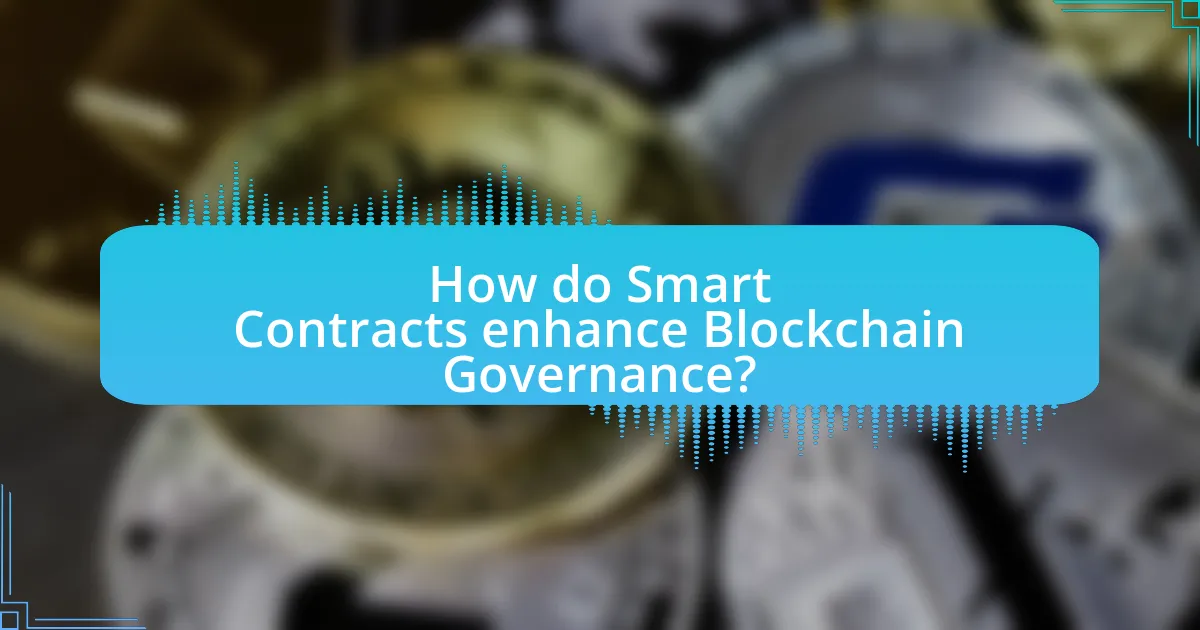
How do Smart Contracts enhance Blockchain Governance?
Smart contracts enhance blockchain governance by automating and enforcing rules without the need for intermediaries. This automation ensures that governance processes are transparent, efficient, and tamper-proof, as smart contracts execute predefined conditions based on the consensus of network participants. For instance, in decentralized autonomous organizations (DAOs), smart contracts facilitate decision-making by allowing stakeholders to vote on proposals, with outcomes automatically enforced by the contract. This reduces the potential for manipulation and increases trust among participants, as evidenced by the successful implementation of smart contracts in projects like Ethereum, which has demonstrated improved governance through community-driven proposals and funding mechanisms.
What specific features of Smart Contracts improve governance processes?
Smart contracts enhance governance processes through automation, transparency, and immutability. Automation allows for predefined rules to execute actions without human intervention, reducing delays and errors in decision-making. Transparency ensures that all stakeholders can access the same information, fostering trust and accountability. Immutability guarantees that once a contract is deployed, its terms cannot be altered, which protects against fraud and manipulation. These features collectively streamline governance by ensuring efficient, reliable, and fair processes.
How do automated execution and self-enforcement contribute to governance?
Automated execution and self-enforcement enhance governance by ensuring that agreements are executed without the need for intermediaries, thereby increasing efficiency and trust. Smart contracts, which are self-executing contracts with the terms of the agreement directly written into code, automatically enforce compliance with predefined rules. This reduces the risk of human error and manipulation, as the execution is based on objective criteria rather than subjective interpretation. For instance, in blockchain governance, smart contracts can automatically allocate resources or execute decisions based on consensus rules, ensuring that all parties adhere to the agreed-upon terms. This mechanism fosters transparency and accountability, as all actions are recorded on the blockchain, providing an immutable audit trail that can be verified by any participant.
What role does immutability play in enhancing governance trust?
Immutability significantly enhances governance trust by ensuring that once data is recorded on a blockchain, it cannot be altered or deleted. This characteristic fosters transparency and accountability, as stakeholders can verify transactions and governance decisions without the risk of manipulation. For instance, in blockchain systems like Ethereum, smart contracts execute predefined rules that are immutable, thereby reinforcing trust among participants who rely on the integrity of the system. The immutability of blockchain records has been shown to reduce fraud and increase confidence in governance processes, as evidenced by studies indicating that organizations utilizing blockchain technology report higher levels of trust among their stakeholders.
What are the potential risks associated with Smart Contracts in governance?
The potential risks associated with Smart Contracts in governance include coding errors, security vulnerabilities, and lack of regulatory clarity. Coding errors can lead to unintended consequences, as seen in the DAO hack of 2016, where a vulnerability in the smart contract code resulted in the loss of $60 million worth of Ether. Security vulnerabilities expose smart contracts to attacks, such as reentrancy attacks, which can compromise the integrity of governance processes. Additionally, the lack of regulatory clarity can create legal uncertainties, making it difficult for stakeholders to understand their rights and obligations, potentially leading to disputes and governance failures.
How can coding errors impact governance outcomes?
Coding errors can significantly undermine governance outcomes by introducing vulnerabilities and unintended consequences in smart contracts. These errors can lead to financial losses, as evidenced by the DAO hack in 2016, where a coding flaw allowed an attacker to siphon off $60 million worth of Ether, disrupting the governance of the Ethereum network. Additionally, coding errors can create loopholes that may be exploited, resulting in a lack of trust among stakeholders and potentially destabilizing the governance framework. The integrity of governance mechanisms relies on the accuracy and reliability of the underlying code, making it crucial to ensure that smart contracts are thoroughly audited and tested to prevent such errors.
What measures can be taken to mitigate these risks?
To mitigate risks associated with smart contracts in blockchain governance, implementing thorough code audits and testing is essential. Code audits identify vulnerabilities and ensure that the smart contract functions as intended, reducing the likelihood of exploits. According to a study by the Blockchain Security Alliance, 70% of smart contract vulnerabilities can be detected through comprehensive audits before deployment. Additionally, employing formal verification methods can mathematically prove the correctness of smart contracts, further minimizing risks. Regular updates and community oversight also play a crucial role in maintaining security and adapting to emerging threats.
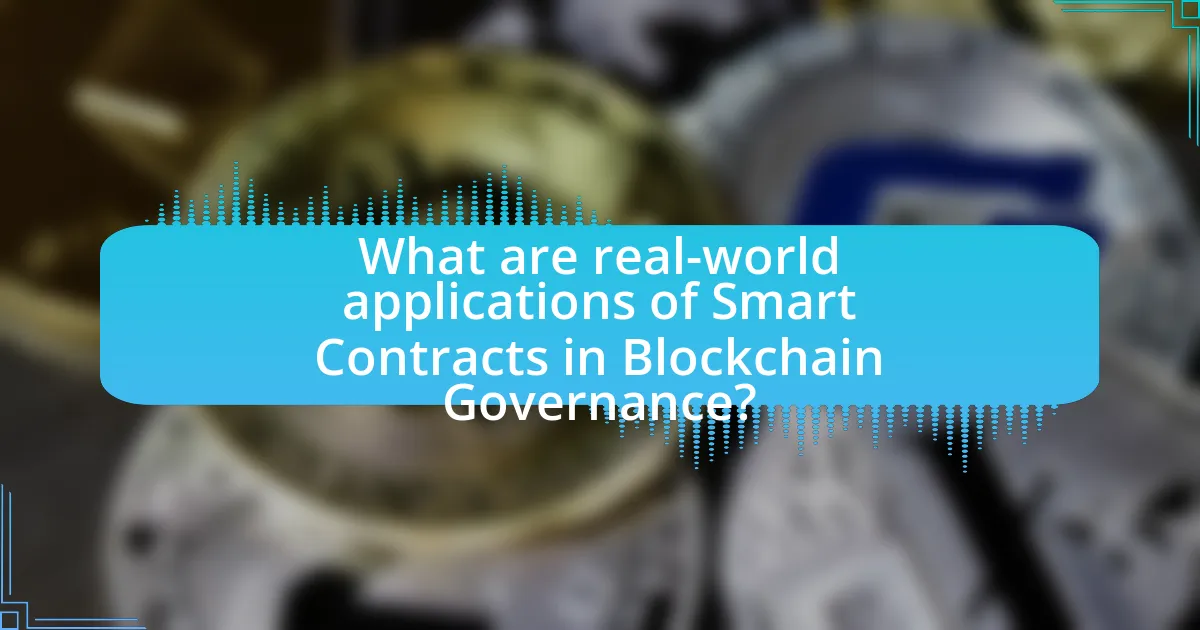
What are real-world applications of Smart Contracts in Blockchain Governance?
Real-world applications of smart contracts in blockchain governance include automated voting systems, decentralized autonomous organizations (DAOs), and regulatory compliance. Automated voting systems utilize smart contracts to ensure transparency and security in electoral processes, as seen in projects like Horizon State, which allows for tamper-proof voting. DAOs leverage smart contracts to facilitate decision-making and resource allocation without centralized control, exemplified by platforms like Aragon, which enables users to create and manage their own DAOs. Additionally, smart contracts assist in regulatory compliance by automating the enforcement of legal agreements, as demonstrated by the use of smart contracts in supply chain management to ensure adherence to regulations. These applications illustrate how smart contracts enhance governance by increasing efficiency, transparency, and accountability.
How are Smart Contracts being used in decentralized organizations?
Smart contracts are utilized in decentralized organizations to automate and enforce agreements without intermediaries. These self-executing contracts run on blockchain technology, ensuring transparency and security in transactions. For instance, decentralized autonomous organizations (DAOs) leverage smart contracts to facilitate governance decisions, allowing stakeholders to vote on proposals directly through the blockchain. This process enhances accountability and reduces the risk of manipulation, as all actions are recorded immutably. According to a report by ConsenSys, smart contracts in DAOs streamline operations and foster trust among participants by eliminating the need for centralized control.
What examples illustrate successful implementation of Smart Contracts?
Successful implementations of smart contracts include the Ethereum-based platform for decentralized finance (DeFi), which automates lending and borrowing processes, exemplified by projects like Aave and Compound. These platforms utilize smart contracts to facilitate transactions without intermediaries, ensuring transparency and efficiency. Additionally, the supply chain management solution by VeChain employs smart contracts to track product provenance, enhancing accountability and reducing fraud. These examples demonstrate how smart contracts can streamline operations and improve governance in various sectors.
How do these examples demonstrate improved governance?
These examples demonstrate improved governance by showcasing how smart contracts automate decision-making processes and enforce compliance without the need for intermediaries. For instance, in decentralized finance (DeFi), smart contracts facilitate transparent and trustless transactions, reducing the risk of fraud and enhancing accountability among participants. Additionally, the use of smart contracts in supply chain management ensures that all parties adhere to agreed-upon terms, as the contract executes automatically when conditions are met, thereby minimizing disputes and increasing operational efficiency. This automation and transparency are critical in establishing a more reliable and efficient governance framework within blockchain ecosystems.
What lessons can be learned from current implementations?
Current implementations of smart contracts in blockchain governance demonstrate the importance of transparency, efficiency, and automation in decision-making processes. For instance, projects like Ethereum’s DAO have shown that smart contracts can facilitate decentralized governance by allowing stakeholders to vote on proposals directly, thereby reducing the need for intermediaries. Additionally, the use of smart contracts has proven to enhance trust among participants, as the code is immutable and publicly accessible, ensuring that all actions are verifiable. These implementations highlight the necessity of robust security measures, as vulnerabilities can lead to significant financial losses, evidenced by the $60 million hack of the DAO in 2016. Overall, the lessons learned emphasize the need for careful design, thorough testing, and community engagement in the development of smart contracts for effective governance.
What best practices should be followed when designing Smart Contracts for governance?
When designing Smart Contracts for governance, best practices include ensuring transparency, implementing robust security measures, and enabling flexibility for future updates. Transparency is crucial as it allows stakeholders to understand contract terms and operations, fostering trust. Security measures, such as thorough testing and audits, are essential to prevent vulnerabilities and exploits, as evidenced by the numerous high-profile hacks in the blockchain space. Flexibility is important to accommodate changes in governance structures or regulations, ensuring the Smart Contract remains relevant and effective over time. These practices collectively enhance the reliability and effectiveness of Smart Contracts in governance contexts.
How can organizations prepare for the integration of Smart Contracts?
Organizations can prepare for the integration of Smart Contracts by conducting thorough assessments of their existing processes and identifying areas where automation and efficiency can be improved. This involves mapping out current workflows, understanding the legal implications of Smart Contracts, and ensuring compliance with relevant regulations. Additionally, organizations should invest in training their staff on blockchain technology and Smart Contract development to build internal expertise.
Research indicates that companies that adopt a structured approach to technology integration, including pilot projects and stakeholder engagement, are more successful in implementing new technologies. For instance, a study by Deloitte found that organizations that actively involve their teams in the transition process experience a 30% higher success rate in technology adoption.
What future trends can we expect in Smart Contracts and Blockchain Governance?
Future trends in smart contracts and blockchain governance include increased automation, enhanced interoperability, and improved regulatory compliance. Automation will streamline processes, reducing the need for intermediaries and increasing efficiency, as seen in the rise of decentralized finance (DeFi) platforms that utilize smart contracts for automated transactions. Enhanced interoperability among different blockchain networks will facilitate seamless interactions, allowing smart contracts to operate across various platforms, which is crucial for the growth of multi-chain ecosystems. Improved regulatory compliance will emerge as governments and organizations develop frameworks to ensure that smart contracts adhere to legal standards, as evidenced by ongoing discussions in jurisdictions like the European Union regarding the regulation of blockchain technologies. These trends indicate a shift towards more robust, efficient, and compliant blockchain governance structures.
How might advancements in technology influence Smart Contracts?
Advancements in technology can significantly enhance the functionality and efficiency of Smart Contracts. For instance, improvements in artificial intelligence and machine learning can enable Smart Contracts to execute more complex conditions and automate decision-making processes, thereby increasing their applicability across various sectors. Additionally, advancements in blockchain scalability solutions, such as sharding and layer-2 protocols, can facilitate faster transaction processing and reduce costs, making Smart Contracts more accessible and practical for widespread use. Furthermore, the integration of Internet of Things (IoT) devices can allow Smart Contracts to interact with real-world data in real-time, enhancing their reliability and effectiveness in executing agreements based on actual conditions. These technological advancements collectively contribute to the evolution of Smart Contracts, making them a more integral part of blockchain governance.
What role will regulatory frameworks play in the evolution of Smart Contracts?
Regulatory frameworks will play a crucial role in the evolution of smart contracts by providing legal clarity and ensuring compliance with existing laws. These frameworks will help define the legal status of smart contracts, which is essential for their adoption in various industries. For instance, jurisdictions like the European Union are actively working on regulations that address digital contracts, which can enhance trust and security in their execution. Furthermore, regulatory clarity can facilitate interoperability between different blockchain systems, as seen in initiatives like the EU’s Digital Services Act, which aims to create a cohesive regulatory environment for digital technologies. This legal backing will encourage businesses to adopt smart contracts, knowing they are operating within a defined legal framework, thus promoting innovation and growth in the blockchain sector.
What practical steps can organizations take to leverage Smart Contracts for governance?
Organizations can leverage Smart Contracts for governance by implementing automated decision-making processes, ensuring transparency, and enhancing accountability. By utilizing Smart Contracts, organizations can automate voting mechanisms, allowing stakeholders to participate in governance decisions securely and efficiently. This automation reduces the potential for human error and manipulation, as the outcomes are determined by pre-defined rules encoded in the Smart Contracts. Furthermore, Smart Contracts provide an immutable record of transactions and decisions, which enhances transparency and allows stakeholders to verify actions taken within the governance framework. This transparency fosters trust among participants, as all actions are publicly accessible and verifiable on the blockchain. Additionally, organizations can establish clear compliance protocols within Smart Contracts to ensure that all governance actions adhere to regulatory requirements, thereby enhancing accountability and reducing risks associated with non-compliance.

